Eric Flint - 1635:The Dreeson Incident
Здесь есть возможность читать онлайн «Eric Flint - 1635:The Dreeson Incident» весь текст электронной книги совершенно бесплатно (целиком полную версию без сокращений). В некоторых случаях можно слушать аудио, скачать через торрент в формате fb2 и присутствует краткое содержание. Жанр: Альтернативная история, на английском языке. Описание произведения, (предисловие) а так же отзывы посетителей доступны на портале библиотеки ЛибКат.
- Название:1635:The Dreeson Incident
- Автор:
- Жанр:
- Год:неизвестен
- ISBN:нет данных
- Рейтинг книги:5 / 5. Голосов: 1
-
Избранное:Добавить в избранное
- Отзывы:
-
Ваша оценка:
- 100
- 1
- 2
- 3
- 4
- 5
1635:The Dreeson Incident: краткое содержание, описание и аннотация
Предлагаем к чтению аннотацию, описание, краткое содержание или предисловие (зависит от того, что написал сам автор книги «1635:The Dreeson Incident»). Если вы не нашли необходимую информацию о книге — напишите в комментариях, мы постараемся отыскать её.
1635:The Dreeson Incident — читать онлайн бесплатно полную книгу (весь текст) целиком
Ниже представлен текст книги, разбитый по страницам. Система сохранения места последней прочитанной страницы, позволяет с удобством читать онлайн бесплатно книгу «1635:The Dreeson Incident», без необходимости каждый раз заново искать на чём Вы остановились. Поставьте закладку, и сможете в любой момент перейти на страницу, на которой закончили чтение.
Интервал:
Закладка:
"Not a lover, probably, if you're worried about bad influences on the boys. This," Simon waved the note in the air, "says he's in his twenties. She's fortyish and the little girl she has with her is only ten or eleven, I think. Probably some ambitious young artist who's finished putting in his practically mandatory time in Italy and is ready to go home and launch himself into a hopefully lucrative career of putting paint on canvas."
Magda snorted. "I will ask someone. I do have responsibilities, after all."
Lausanne
Switzerland
Duke Henri de Rohan put down his pen. He had finished today's letter to his brother Benjamin in England, but hadn't signed it yet, in case something else came to mind. He re-read. After his assassination attempt on the Pope was foiled, Michel Ducos was last seen escaping by boat down the Tiber, presumably to take ship from Ostia. I predict that he will not go back to d'Avaux. In any case, Mazarini is ensuring that d'Avaux will have only minimal chances to foment mischief in the future. I am afraid that Ducos has become the head of a small group of unpredictable fanatics. Keep an eye out in England for any sign of him and his followers. Though, of course, he may be headed for Holland. Or Scotland. Or…
He picked up the pen again. I am also writing to our agent in Frankfurt am Main. If necessary, please be prepared to make a rapid trip to Frankfurt. You should find the burden of this bearable, since to a considerable extent our associates there are also members of a network of international wine merchants. He paused a moment, then signed his name.
The duke moved on, to finish his outgoing correspondence for the day. Happily, his new assignment from Venice, attempting to reconcile the feuding Swiss cantons, significantly reduced the time it took for his letters to reach their destinations. Instructions for his wife in France; a shorter note to his father-in-law, also in France; one to his brother Benjamin, in care of Isaac de Ron in Frankfurt; a letter to Hugo Grotius, another to the mathematician Descartes. One to the city council of the Most Serene Republic of Venice, which was dithering about whether or not to renew his employment contract.
And one to Cardinal Richelieu, assuring him, with the monotonous regularity he brought to such reassurances, that he remained a loyal and faithful subject of the French monarchy.
The duke missed his long and faithful correspondence with his mother, who had died three years earlier. If he was not concentrating, Rohan often still found himself thinking that he should mention something to her.
Now, a letter to his daughter Marguerite, in France with her mother. Marguerite had been born almost fifteen years after the wedding and was now seventeen years old. Of the nine children of his marriage, only she had survived. When he finished it, he started to put down his pen and then picked it up again.
One to Duke Bernhard of Saxe-Weimar. After Bernhard's successes this summer, it was time to consider the possibility that he might make a suitable son-in-law. He was thirty. It was time for him to be getting married. Marguerite had the splendid advantage that she was already old enough to bear children and still young enough to bear a lot of children, God willing.
The Austrians would probably try to pick Bernhard off with some minor Habsburg bride, of course, to protect their interests in Vorarlberg and the other territories dotted across southern Swabia to the Breisgau. But it would be a terrible pity, in Rohan's opinion, to waste a successful Protestant prince on a Catholic wife.
True, Bernhard was Lutheran, not Calvinist as was the duke himself. But Lutherans counted as Protestants, at least from the political perspective, the same way that members of the Church of England did. If not, quite, theologically. After all, the Lion of the North himself was a Lutheran. German-language Catholic popular pamphleteers, an imprecise group of people sadly lacking in perception where the nuances of doctrinal distinction among their opponents were concerned, tended to refer even to Calvinists and Anabaptists as Lutheraner.
Even the city council of Venice had been known to refer to Duke Henri de Rohan himself as a "Lutheran." The most prominent Huguenot in contemporary France shuddered slightly at such a lack of theological precision.
A match between Marguerite and Bernhard would not make King Louis XIII of France and Cardinal Richelieu at all happy, of course. But then neither would a match between Marguerite and young Turenne, which was also an attractive possibility. The only thing that would make Louis and Richelieu happy would be for Marguerite to convert to Catholicism and marry one of Richelieu's relatives.
Which wasn't going to happen. At least not as long as Henri de Rohan was alive.
Then he wrote directly to Isaac de Ron in Frankfurt, telling him to expect the arrival of Henri's brother Benjamin (letter to him enclosed) from England any day now.
Please take out a lease on a suitable town house and have it furnished and staffed with reliable people by the time he arrives, charging the cost to my account with the banker Milkau.
Benjamin liked his comforts. He accomplished more when he was comfortable.
Now for the inbox. On top of it, the latest report from Leopold Cavriani. A delightful man. He'd had a really fascinating summer. Leopold did not suffer from the constraints that were an inevitable part of having been born into the high nobility.
Occasionally, Henri de Rohan envied him.
But only occasionally.
Somewhere in Switzerland
"If he pontificates at me one more time," Ron Stone said, "I think I'll gag. I don't see how Gerry can stand to listen. Hour after hour, after hour."
"Your brother isn't listening, really. He's just… not bothering to avoid Joachim." Artemisia Gentileschi smiled patiently.
"How much more do we need to know about him? Hell, we already know more than enough." Ron grabbed onto the reins with one hand and waved the other in the air. "Talk, talk, talk, talk, talk, talk, jabber, pontificate, talk some more. We've already heard that he was born in Frankfurt, that his family are Calvinists who fled from the Spanish Netherlands because of religious persecution, that he apprenticed with Soreau and Stoskopff in Hanau and can't face a future limited to still-lifes so he'll probably have to work for Catholic patrons mostly, that he learned print making in Nurnberg, that the engraver he worked for in Prague advised him to specialize in painting, that he learned to paint from Gerard van Honthorst in Utrecht, that he toured Holland with Pieter Paul Rubens, that he worked at the English court for a while with Honthorst, that he has not only seen Florence, Rome, and Naples, but also Messina and Malta, that he thinks the war has ruined the career prospects of most German artists, that…" He stopped. "If I hear one more word about the trials, troubles, and travails of the 'Frankenthal exiles,' I think I'll spit. What's worse, the guy talks in capital letters." He groaned with disgust.
Simon Jones, riding on his other side, laughed out loud. Joachim Sandrart did talk in capital letters. He didn't speak, he orated.
He was doing it now.
"Time and again Queen Germania has seen her Palaces and Churches, decorated with splendid Painting, go up in Flames, and her Eyes are so darkened with Smoke and Weeping that she no longer has the Desire or the Strength to pay Heed to this Art: Art that now seems to want only to enter into a long and eternal Night and there to sleep. Perhaps a man may find a short Contract with one Ruler. But as the Scene of War moves, so, perforce, does he, leaving his Efforts unfinished. And so such Things fall into Oblivion, and those that make Art their Profession fall into Poverty and Contempt. They put away their Palettes and Easels. They must take up the Pike, the Sword, or the Beggar's Staff instead of the Paintbrush, while the Gently Born are ashamed to apprentice their Children to such despicable Persons."
Читать дальшеИнтервал:
Закладка:
Похожие книги на «1635:The Dreeson Incident»
Представляем Вашему вниманию похожие книги на «1635:The Dreeson Incident» списком для выбора. Мы отобрали схожую по названию и смыслу литературу в надежде предоставить читателям больше вариантов отыскать новые, интересные, ещё непрочитанные произведения.
Обсуждение, отзывы о книге «1635:The Dreeson Incident» и просто собственные мнения читателей. Оставьте ваши комментарии, напишите, что Вы думаете о произведении, его смысле или главных героях. Укажите что конкретно понравилось, а что нет, и почему Вы так считаете.











